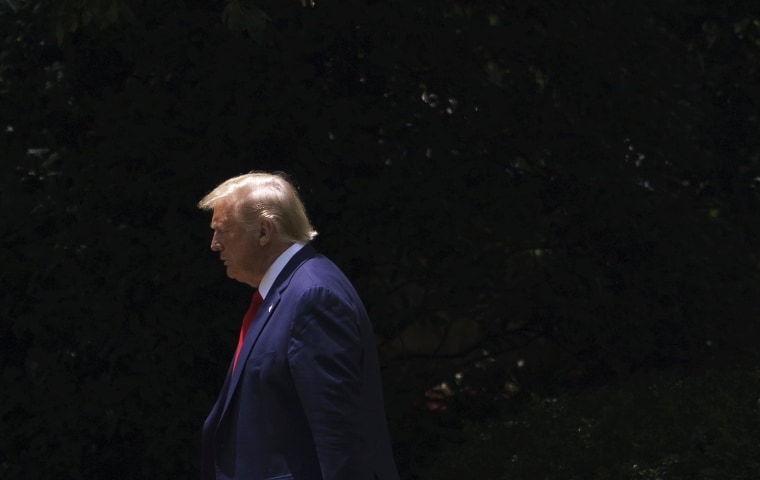During his Fox News interview yesterday, Donald Trump was reminded that many U.S. military leaders believe it's time to change the name of bases named after Confederate generals. "I don't care what the military says," the president said. "I'm supposed to make the decision."
Moments later, the Republican added, "We’re going to name it after the Rev. Al Sharpton?"
In context, no one had brought up the MSNBC host and no one has suggested naming installations after Sharpton. Trump simply wanted to defend the practice of naming U.S. military bases after Confederates who took up arms against American troops. And to help bolster his case, the first name that came to the president's mind as an example of someone who shouldn't be honored was a prominent voice from the African-American community.
Soon after sitting down with Chris Wallace for the interview, Trump held a tele-rally with Wisconsin Republicans, where race remained on his mind.
On Friday evening, he told supporters in Wisconsin that Mr. Biden supported an Obama-era fair-housing rule. “They want to eliminate single-family zoning, bringing who knows into your suburbs, so your communities will be unsafe and your housing values will go down,” he said.
It's about as subtle as a sledgehammer.
An Associated Press report noted over the weekend that fair-housing advocates are speaking up to describe Trump's rhetoric as a "blatant attempt to play racial politics and appeal to white voters in the final weeks before the election."
Diane Yentel, president of the National Low-Income Housing Coalition, told the AP, “He’s flatly saying that property values will go down and crime will increase if black people move into your neighborhoods. It’s especially abhorrent for Trump to be furthering racial entrenchment of segregated communities at this moment in our history.”
Circling back to our coverage from last week, it's worth remembering that for much of Trump's presidency, he barely mentioned American suburbs. There was a grand total of one tweet that referenced the suburbs in his first three years in office, and according to the Factbase database, the Republican's presidential speeches also made little mention of suburban communities.
Now, however, Trump is suddenly preoccupied with suburbs and their pending doom. On Tuesday, for example, during a campaign event in the White House Rose Garden, the president said Democrats are "going to abolish the suburbs."
On Thursday, he went a little further, insisting that Democrats "will totally destroy the beautiful suburbs.... People who have worked all their lives to get into a community and now they’re going to watch it go to hell."
Naturally, Trump has echoed the sentiment with tweets.
It's easy to imagine what led to Trump's sudden fixation on all things suburban. In fact, it seems pretty obvious: after barely ever uttering the word for most of his presidency, Trump was almost certainly told that polls show him hemorrhaging support from voters in suburbs. It coincided with the president's belief that a message based on racial grievances and racial animus will help give his struggling campaign a boost.
And so, Trump is tying the two threads together. NBC News' Jonathan Allen explained last week, "President Donald Trump says Joe Biden wants to 'abolish the suburbs.' But what he appears to mean is that Biden wants to stop suburban segregation.... Watching Trump talk about the issue is like playing a documentary on the civil rights movement in reverse slow motion."
The president has earned a reputation for speaking in racial codes, but this latest push doesn't require a cypher.
At issue is a policy called the Affirmatively Further Fair Housing rule (AFFH), which is designed to help implement provisions of the Fair Housing Act of 1968. As a Washington Post fact-check piece explained:
The rule, which was finalized in July 2015 and been in limbo since Obama left office, is designed to push “meaningful actions, in addition to combating discrimination, that overcome patterns of segregation and foster inclusive communities free from barriers that restrict access to opportunity based on protected characteristics.” Put simply, it was designed to help state and local officials provide better access to opportunity, following the original 1968 guideline.
What Trump is describing as a policy intended to "abolish" suburbs is actually a federal rule designed to counter segregation in housing.
It's a subject the Republican ought to know well: the Justice Department accused Trump of violating the Fair Housing Act several decades ago as part of the future president's discriminatory practices against African-American renters.
Nearly a half-century later, Trump's views on discrimination in housing are every bit as offensive.

